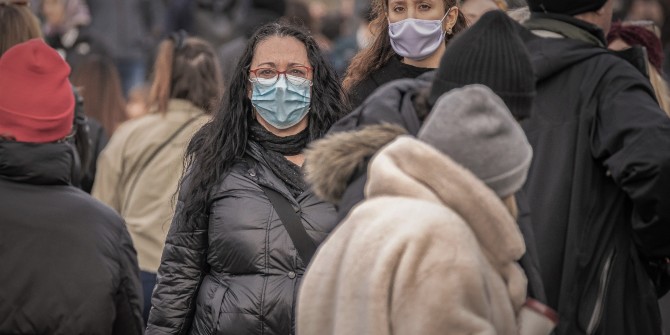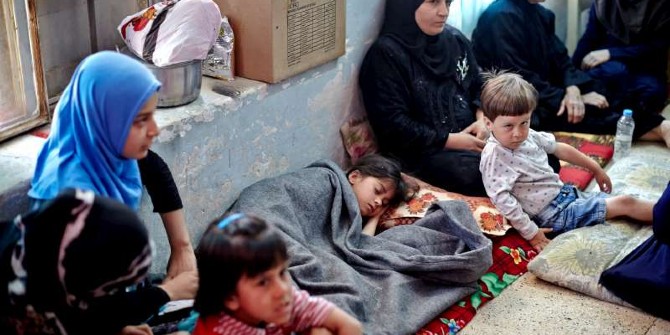Arundhati Roy has called for COVID-19 to be seen as a portal to a better and more sustainable world. Karen Scott and Nick Kirsop-Taylor (University of Exeter) argue that a new political focus on wellbeing would enable us to rebuild a more equitable world.
The COVID-19 pandemic has brought deep societal problems to the surface. It has given new impetus to long standing debates about growth-centric economics, sustainable development and human flourishing. Thomas Piketty has argued that COVID-19 has thrown an even harsher light on the inherent inequalities in society, and the persistent under-valuation and precarity of workers who provide essential services.

During lockdown in the UK, some have been able to adapt safely, enjoying less commuting, cleaner air, sunlit gardens, returning wildlife, and appreciating the importance of human-nature relationships. Others have experienced extreme isolation with no access to green space, increased burdens and serious physical and financial insecurity, with terrible impacts on wellbeing. Many have died.
The COVID-19 virus does not discriminate, but privilege does. The current patterns of vulnerability to infection have been woven into the fabric of society by centuries of systemic injustice. For many, there can be going back to ‘normal’ when normal is deeply unsettling, unjust and unsustainable. Frank Snowden argues that pandemics in the past have precipitated radical change to address deep-seated problems – depending on culture, politics and ideas circulating. They open up moments of societal, political and cultural flux. Arundhati Roy suggests we are now in a portal between ‘the doomsday machine we have built for ourselves’ and a world imagined anew.
Sustainable wellbeing and GDP
A recent report from Positive Money, The Tragedy Of Growth, used independent polling to argue that a majority of citizens want the UK government to prioritise wellbeing indicators over GDP. The call for a focus on wellbeing rather than economic growth is not new in contemporary debates. It builds on two decades of growing political and policy interest in the concept and measurement of wellbeing. These concerns intensified after 2008 and the widespread acknowledgement that the engines of economic growth are backfiring.
The OECD has invested heavily in its Better Life Index, which provides a comparison of wellbeing across the richest nations of the world, and many nations have developed their own measurements. In 2010 David Cameron launched a Measuring National Wellbeing project and charged the ONS to develop wellbeing indicators. He declared a desire to ‘open a national debate about how together we can build a better life’. Ten years on and despite some positive developments and the work of the ESRC What Works for Wellbeing centre, these indicators have yet to make an impact on economic policy in the UK. There was a focus on nudging people to make better lifestyle choices rather than producing any radical challenge to systemic problems.
A recent international collaboration is noteworthy. New Zealand, Iceland and Scotland joined to form the Wellbeing Economy Governments initiative in 2018. Wales has now joined them. In 2019 Jacinda Adern, the Prime Minister of New Zealand, announced a ‘wellbeing budget’ while Finland’s Social Affairs Minister Pirrko Mattila announced their Economy of Wellbeing approach. Their proposals have embedded the notion of wellbeing firmly within social justice and ecological health. They are a small but inspiring challenge to macroeconomics as usual, and they provide an important counterpoint to the hubristic defence of economic conservatism in some other countries.
The pandemic portal
Through the lockdown, we are already witnessing the benefits of reducing pollution and consumption, using more sustainable travel, supporting local food production, and allowing nature to return. Through the grief and hardship there are hope-filled glimpses of what more sustainable states might look like in practice. London has already introduced permanent traffic reduction strategies, using this moment of crisis as an opportunity to accelerate sustainable development policies.
This crisis can and should fundamentally challenge decades of received ‘wisdoms’ about what the state can achieve. Despite its failings, the state is the main mechanism for ensuring the things we value are put into practice by the institutions we depend on. Evidence shows clear citizen preference for a) post COVID-19 policies that build more sustainable societies and b) states that prioritise citizen wellbeing over economic growth as their primary organising principle.
If as part of #BuildBackBetter states construct new economic principles and measurements which are organised around sustainable wellbeing rather than production and consumption, then the tension between economic health and ecological destruction can be reduced. Prioritising healthy and abundant natural environments should be elevated to a first-tier accountability of the state. For many decades environmental state theorists have discussed the ‘outcome’ they want to see, with few practical prescriptions for the catalysts that will kick off the great transition. We argue that using the COVID-19 portal to build on existing wellbeing policy initiatives might prove the catalyst – as long as the notion of wellbeing is not reduced to an individual lifestyle focus, which glosses over environmental destruction, social inequalities and does nothing to fundamentally shift economic systems.
Fortunately some states are already attempting this, recognising and grappling with the tremendous challenge to current institutional culture it presents. For example, Wales passed the Wellbeing of Future Generations (Wales) Act (2015) which, it is hoped, will in time become a central organising principle leading to re-constructed logics, assumptions and cultures of the state. In previous research with actors from the Welsh government we found that explicit attempts to change ways of working and mindsets is key in this transition. As we move to a post-COVID-19 era, we must pay greater attention to institutional cultures in order to understand our abilities to undertake this transition. This may not be the only global crisis we witness in our lifetimes. Our governing institutions must be up to the task.
We were due to present these arguments at the Political Studies Association’s annual conference, before it was postponed. This work-in-progress paper address key questions that need to be considered – such as how to balance individual wellbeing with the collective ecological good and planetary boundaries, how this builds upon and integrates theories of post-consumerism, civics and participatory democracy, and how to integrate this new emphasis on wellbeing with other accountabilities.
Amongst all the pain and turmoil Covid-19 is showing people that the boundaries of what the state can do should be radically reconsidered – and that citizens want and demand us to measure wellbeing as a measure of societal progress. Many pre-COVID-19 norms are now unsustainable and embedded in past dependencies and cultures. Short-term policies to deal with the crisis will reflect those cultures: we need a wider societal movement to achieve change on the scale proposed, and that requires political and civic leadership, vision and mission. As Arundhati Roy says, if COVID-19 is the portal, let’s step through it ‘lightly, with little baggage, ready to start anew.’
This post represents the views of the authors and not those of the COVID-19 blog, nor LSE.





